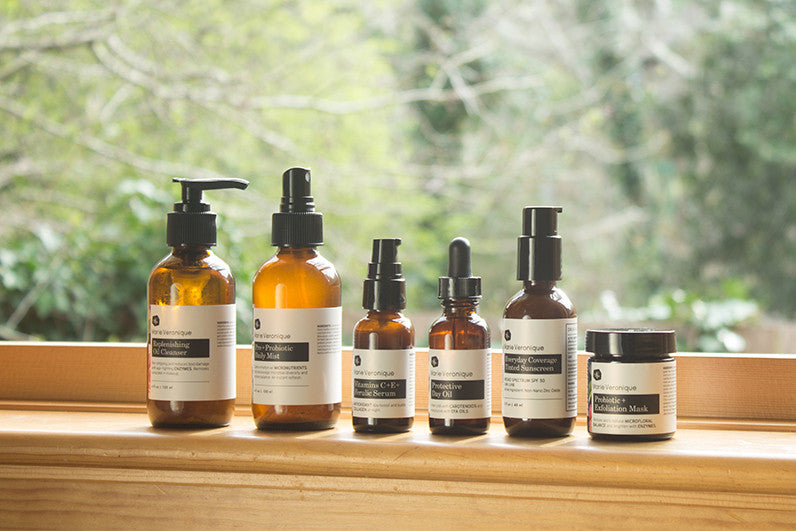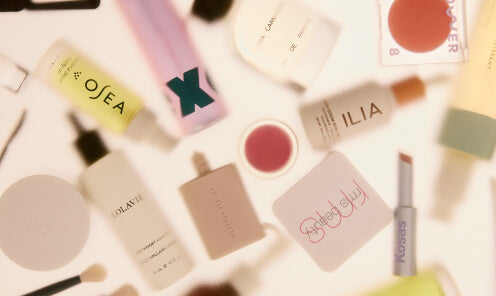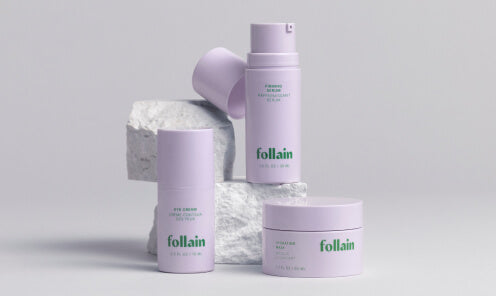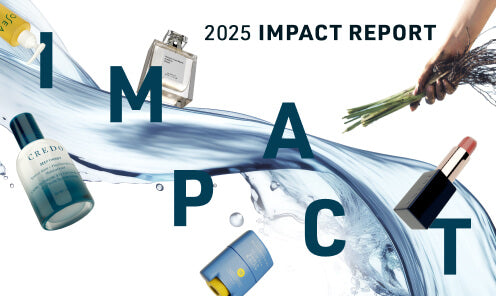Chemist and master formulator, Marie Veronique, answers your most pressing questions where she addresses skin concern, the link between diet and complexion, what inspires her, and much more.
Morgan “I have a few questions about cleansing. I usually use the Replenishing Oil Cleanser at night, however, If I apply makeup in the evening, I use the Gentle Gel Cleanser to more thoroughly remove the recently applied makeup. I've noticed that it does not fully remove the makeup as it shows up on my towel when I dry. Is there a better way to remove fresh makeup? Also, I'd love to know more about facial massages when using the Replenishing Oil Cleanser.”
Cleansing away all traces of makeup may take two passes. What about cleansing first with Replenishing Oil Cleanser and a muslin cloth. Then you can cleanse a second time with the Gentle Gel Cleanser and rinse. To follow use a cotton pad and wet with the mist. Swipe across entire face and if the pad is clean, then you have removed all your makeup/sunscreen. As for a facial massage with the Replenishing Oil Cleanser, I more or less massage it in for about 1 minute by using three fingers in small circular movements, then splash on water to get suds, massage for another 30 seconds, then rinse multiple times with water or with a warm, wet, muslin cloth.
Harmony “I am a nursing mother, are there any of her products that she would recommend that replenishes some of the nutrients that I lose from breast feeding? Not to mention keeping my eyes from looking as tired as they feel. Also, is there anything in general she recommends?”
Great question! I would recommend our Vitamin C+E+Ferulic Serum for sure, as there is such a demand for Vitamin C on the body anyway, and especially when nursing, and nature prioritizes. The first one to get access to available Vitamin C is the infant, which is good, but the last in line is the skin, which is not so good, because Vitamin C is necessary to build collagen--no Vitamin C, no collagen. Topical Vitamin C will make sure that even when your body is making major withdrawals on your Vitamin C reserves you are still getting Vitamin C into the skin tissue. Also make sure you are using the Soothing B3 Serum and an oil (Protective Day Oil and Rejuvenating Night Oil) to compensate for hydration levels and important EFAs (all which go to the baby). For around the eyes we have the Eye Repair Serum which is a gel-like serum that is light and cooling in addition to being super hydrating. It contains carnosine to combat aging as well as ingredients that work in combination to brighten the skin.
In general, I am of the opinion that everyone is deficient in B vitamins, and nursing requires a constant supply, not to mention the need to boost thyroid and immune function. Nutritional yeast is a good source of Vitamin B complex, and an easy way to supplement your diet. These foods will also help the body move hormonal waste and provide for key organ boosting micronutrients.
- More dark leafy greens: kale, spinach, swiss chard, collard greens, escarole, dandelion greens, radicchio, bok choy, watercress
- Cruciferous vegetables: brussel sprouts, broccoli, cauliflower (great for boosting/supporting liver detoxification)
- Other starchy vegetables and alliums: beets, sweet potato, butternut squash, onions, leeks, celery root, carrots, fennel
- Low glycemic fruits: berries (can buy frozen this time of year and thaw/keep in a container in the fridge), green apples, pears, some citrus, especially lemon
- Nuts/nut butters: incorporating a variety instead of just pecan (unless there’s an allergy/sensitivity?) - almond, cashew, walnut, hazelnut, etc. - also snacking on a few brazil nuts per day (to boost selenium for thyroid health) - and soaked or sprouted nuts for snacking
- Animal proteins: grass-fed beef, wild-caught fish, bone broth.
Kathy “I am 64 - and beginning to see multiple age spots on my hands and face. Is there any way to minimize or reverse this type of damage? (I use the zinc oxide sunscreen religiously - but this damage goes back years ago.). I now spend a lot of time in Central America and try not to go out when the sun is at its strongest, use zinc sunscreen and a hat. Any other advice?”
Reversing sun damage is the work of Vitamin A derivatives, specifically retinol (non-prescription) or retinoic acid (prescription). Our Gentle Retinol Night Serum is a great way to start reversing some of the damage, but if it is long-standing it will take awhile. You can combine it with the Lightening Serum for faster results. Expect to stick with it for 2-3 months before seeing significant improvement.
For protecting against sun damage, most dermatologists recommend using anti-oxidants in addition to a mineral sunblock. So, before going out in the sun apply our Vitamin C+E+Ferulic Serum (it boosts UV protection eightfold).
Then apply sunscreen, ideally SPF 30 zinc oxide only (like our Everyday Coverage Tinted Sunscreen which you use), wear a hat and avoid direct exposure during the burning hours—10-4, if possible.
One last tip—when you get out of the sun apply Vitamin C+E+Ferulic Serum again—antioxidants may help limit damage that occurs from ongoing free radical damage that continues to happen in the absence of sun—so-called “dark damage.”
Raina “Can I get away with just using the Vitamin C E Ferulic Acid for now? I feel like the retinol makes my skip kinda flakey. If so, when should I start using the retinol? If I should be using retinol, how often?”
Flaky skin from retinol is a good sign—it means that the retinol is working, your cell turnover rate is increasing and skin cell development is normalizing.
If you suffer from acne you can start retinol as a teenager. Otherwise start retinol at around age 30—this is when your skin is starting to change from youthful to slowing down. You can start by using it 2-3 times a week, and as skin adjusts, go to every night. The earlier you start retinol the longer you can delay the aging process, but there’s no point in using it before your skin is technically aging, which is around age 30 or so.
Julianne “What is your best regimen for rosacea skin conditions?”
Rosacea conditions vary from individual to individual, but calming inflammation is part of it.
To calm inflammation topically: Soothing B3 Serum day and night. Wear a zinc oxide only sunscreen every day to avoid sun damage that can lead to erythema that can exacerbate rosacea every time you go out in the sun. You can treat the occasional flareups with Redness Relief Serum, which has anti-inflammatories like licorice root and curcumin. You can also take turmeric internally, as it helps calm inflammation that may be starting from the gut.
Rosacea can be genetic, caused by UV exposure, caused by Human demodex infestation, originate in the gut, be related to other environmental factors, be related to skin microbiome imbalances from using microcidal or allergenic, highly fragranced products, or all of the above, and that’s just for starters! Rosacea can be complicated, and it is usually a highly individualized problem—I recommend reading the Acne Answer’s several chapters on treating rosacea to see what treatments might work for you.
Bridget “Is the Pre+Probiotic Daily Mist the same as a toner?”
No, a toner is more of an astringent, whereas a mist is more of a hydrator. Toners are generally applied to the skin with a cotton ball, whereas mists are sprayed on. The pH of a toner can be either higher or lower than normal skin pH, which is around 5.5, while a mist is generally in the normal skin range, as its purpose is to keep skin’s environment microbiome friendly.
Jill “I recently started using the Gentle Retinol Serum, and someone recommended the Intensive Repair Serum. Can both be used at the same time, and what effect would that have on the effectiveness of each product?”
You can use them together, and it is a synergistic relationship. Intensive Repair Serum contains AHAs and BHAs to help exfoliate skin, and dermatologists often recommend using an AHA type product with a retinoid to help the retinoid penetrate more readily. In fact, the latest craze among dermatologists is a retinoid conjugate that combines a retinoid with an AHA so you get both effects at the same time. I like our system better, as I don’t think one should use AHAs and retinoids together every night, unless you are struggling with serious acne. Ideally, use the Intensive Repair Serum with the Gentle Retinol Night Serum 2-3 times a week, and the rest of the time use Retinol.
Kathy “The water quality in New Jersey is tenuous at best - particularly when it comes to chlorine, chromamine, lead, and other contaminants. Any comment regarding the role of water quality and water in general - and the impact on aging skin?”
Really great question, and one we should all be paying attention to. I suspect contaminated water is the reason we are seeing rising rates of atopic dermatitis, rosacea, adult acne and yes, premature aging. The contaminants increase our need for anti-oxidants taken both internally and externally, since the problem encompasses both water intake and skin exposure. Here are some suggestions:
-Besides using a reverse osmosis water filter for drinking water we should also filter the water that we wash with.
-Take generous doses daily of antioxidants like C, E and CoQ 10, and essential fatty acids, especially of the omega-3 type.
-Drink 3-4 cups of green tea a day. Also look for ECGc in your serums and mists; this extract from green tea is a great anti-oxidant.
-Feed the skin topically with daily doses of anti-oxidants found in mists and serums, eg, Vitamin C+E+Ferulic Serum, Gentle Retinol Night Serum, Pre+Probiotic Daily Mist
-Plump up the barrier layer with EFA rich oil blends and stratum corneum enhancers, eg., Rejuvenating Night Oil and Protective Day Oil.
Delna -"At what point do you believe natural and medical skincare should cross? Or do you think they should not cross at all?"
Really glad you asked that question. Medical research has given us a tremendous advantage when it comes to making products that are actually effective. Those ingredients that we know work—like encapsulated retinol and ascorbic acid in an anhydrous solution—come out of state-of the art research done by clinicians abetted by highly sophisticated technology. We are going to see in the next few years a merging of science, medical technology and the natural world as we explore the skin microbiome. It’s very exciting to be on the threshold of this brand new terrain, and I actually see my job as bringing the two worlds—medicine and alternative approaches-- together.
Phoede "What is the process you go through before you begin developing a new product?"
I get a lot of inspiration from my customers, and I must say I am fascinated when Kristina brings me stories about the people she is treating, many of whom come to her with serious problems. I welcome a challenge, so I love the stories that begin…I have tried everything. Because I can imagine them one day ending the sentence with…and then I found Kristina and your products and for the first time in my life I have beautiful skin!” Hey, it happens. So I guess my process is to imagine the last part of the sentence before I start. They say this is how Agatha Christie wrote her murder mysteries, starting with ending and finishing at the beginning, which makes perfect sense. It’s a lot easier to just back engineer from your end point.
Anna "Are your products 100% gluten free?"
Yes.
Jessica "Has she found any major links between acne and diet (dairy, gluten, sugar, etc)?"
There are links between your diet and gut health certainly, and a gut whose microflora is all out of balance because you eat nothing but Twinkies can certainly, and probably will, show up in the way of skin problems of some sort, not to mention brain fog. There is such a thing as the gut-skin-brain axis. However, raw food diets and kale overindulgence are just as bad as they can deplete key micronutrients that are required by our internal organs. In general the reason that acne can be worsened by dairy, gluten, and sugar are because those are all inflammatory causing foods. They can create blood sugar imbalances, insulin spikes and potentially trigger inflammatory conditions in the digestive system. They are not CAUSING the acne, but they may make the body more vulnerable to inflammation based symptoms. Instead of highlighting foods as being “bad” or “good”, it can be more helpful to investigate the bigger picture. How are your blood sugar levels, how is your elimination, are you bloated, etc. From there you can use food to help restore balance and reduce inflammation levels. The impact on the skin from foods is INDIRECT not DIRECT, still important, however not the only reason.
Thank you Marie!
Bay Area, you're in for a special treat! On May 17th, Marie Veronique and Kristina Holey will at the Credo Fillmore (2136 Fillmore St.) store from 5 to 7 doing mini facials and answering all your questions. If you're outside the area, we'll be featuring the event live on Facebook and Instagram at 6:30 pm. Look forward to seeing you there.
















